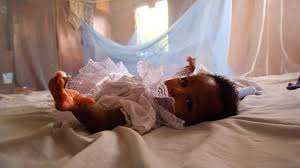
Healthcare in Africa faces a perfect storm: high rates of infectious diseases like malaria and HIV, a rise in non-communicable diseases, and dwindling foreign aid.
In 2021, nearly half of the sub-Saharan African countries relied on external financing for more than a third of their health expenditure. But donor fatigue and competing global priorities, such as climate change and geopolitical instability, have placed malaria control programmes under immense pressure. These funding gaps now threaten hard-won progress and ultimately malaria eradication.
The continent’s healthcare funding crisis isn’t new. But its consequences are becoming more severe. As financial contributions shrink, Africa’s ability to respond to deadly diseases like malaria is being tested like never before.
Malaria remains one of the world’s most pressing public health threats. According to the World Health Organization there were an estimated 263 million malaria cases and 597,000 deaths globally in 2023 – an increase of 11 million cases from the previous year.
The WHO African region bore the brunt, with 94% of cases and 95% of deaths. It is now estimated that a child under the age of five dies roughly every 90 seconds due to malaria.
Yet, malaria control efforts since 2000 have averted over 2 billion cases and saved nearly 13 million lives globally. Breakthroughs in diagnostics, treatment and prevention have been critical to this progress. They include insecticide-treated nets, rapid diagnostic tests, artemisinin-based combination therapies (drug combinations to prevent resistance) and malaria vaccines.
Since 2017, the progress has been flat. If the funding gap widens, the risk is not just stagnation; it’s backsliding. Several emerging threats such as climate change and funding shortfalls could undo the gains of the early 2000s to mid-2010s.
New challenges
Resistance to drugs and insecticides, and strains of the malaria parasite Plasmodium falciparum that standard diagnostics can’t detect, have emerged as challenges. There have also been changes in mosquito behaviour, with vectors increasingly biting outdoors, making bed nets less effective.
Climate change is shifting malaria transmission patterns. And the invasive Asian mosquito species Anopheles stephensi is spreading across Africa, particularly in urban areas.
Add to this the persistent issue of cross-border transmission, and growing funding shortfalls and aid cuts, and it’s clear that the fight against malaria is at a critical point.
As the world observes World Malaria Day 2025 under the theme “Malaria ends with us: reinvest, reimagine, reignite”, the call to action is urgent. Africa must lead the charge against malaria through renewed investment, bold innovation, and revitalised political will.
Reinvest: Prevention is the most cost-effective intervention
We – researchers, policymakers, health workers and communities – need to think smarter about funding. The economic logic of prevention is simple. It’s far cheaper to prevent malaria than to treat it. The total cost of procuring and delivering long-lasting insecticidal nets typically ranges between US$4 and US$7 each and the nets protect families for years. In contrast, treating a single case of severe malaria may cost hundreds of dollars and involve hospitalisation.
In high-burden countries, malaria can consume up to 40% of public health spending.
In Tanzania, for instance, malaria contributes to 30% of the country’s total disease burden. The broader economic toll – lost productivity, work and school absenteeism, and healthcare costs – is staggering. Prevention through long-lasting insecticidal nets, chemoprevention and health education isn’t only humane; it’s fiscally responsible.
Reimagine: New tools, local solutions
We cannot fight tomorrow’s malaria with yesterday’s tools. Resistance, climate-driven shifts in transmission, and urbanisation are changing malaria’s patterns.
This is why re-imagining our approach is urgent.
African countries must scale up innovations like the RTS,S/AS01 vaccine and next-generation mosquito nets. But more importantly, they must build their own capacity to develop, test and produce these tools.
This requires investing in research and development, regional regulatory harmonisation, and local manufacturing.
There is also a need to build leadership capacity within malaria control programmes to manage this adaptive disease with agility and evidence-based decision-making.
Reignite: Community and collaboration matters
Reigniting the malaria fight means shifting power to those on the frontlines. Community health workers remain one of Africa’s greatest untapped resources. Already delivering malaria testing, treatment and health education in remote areas, they can also be trained to manage other health challenges.
Integrating malaria prevention into broader community health services makes sense. It builds resilience, reduces duplication, and ensures continuity even when external funding fluctuates.
Every malaria intervention delivered by a trusted, local health worker is a step towards community ownership of health.
Strengthened collaboration between partners, governments, cross-border nations, and local communities is also needed.
The cost of inaction is unaffordable
Africa’s malaria challenge is part of a deeper health systems crisis. By 2030, the continent will require an additional US$371 billion annually to deliver basic primary healthcare – about US$58 per person.
For malaria in 2023 alone, US$8.3 billion was required to meet global control and elimination targets, yet only US$4 billion was mobilised. This gap has grown consistently, increasing from US$2.6 billion in 2019 to US$4.3 billion in 2023.
The shortfall has led to major gaps in the coverage of essential malaria interventions.
The solution does not lie in simply spending more, but in spending smarter by focusing on prevention, building local innovation, and strengthening primary healthcare systems.
The responsibility is collective. African governments must invest boldly and reform policies to prioritise prevention.
Global partners must support without dominating. And communities must be empowered to take ownership of their health.
The authors do not work for, consult, own shares in or receive funding from any company or organisation that would benefit from this article, and have disclosed no relevant affiliations beyond their academic appointment.
By Taneshka Kruger, UP ISMC: Project Manager and Coordinator, University of Pretoria And
Tiaan de Jager, Dean: Faculty of Health Sciences and Director: UP Institute for Sustainable Malaria Control, University of Pretoria


